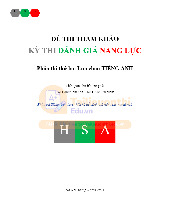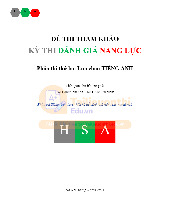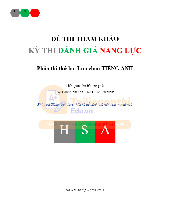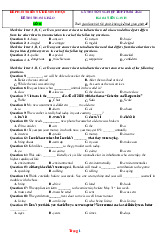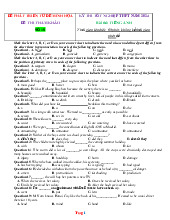





Preview text:
ĐỀ THI THỬ TỐT NGHIỆP THPT QUỐC GIA 2024 Bài thi: NGOẠI NGỮ; Môn thi: TIẾNG ANH SỞ GIÁO DỤC & ĐÀO TẠO NGHỆ AN Thời gian làm bài: 60 phút, 50 câu hỏi trắc nghiệm |
Mark the letter A, B, C, or D to indicate the word that differs from the other three in the position of the primary stress in each of the following questions.
Question 1. A. regard | B. manage | C. reform | D. protect |
Question 2. A. understand | B. entertain | C. interact | D. compassion |
Mark the letter A, B, C, or D to indicate the word whose underlined part differs from the other three in pronunciation in each of the following questions.
Question 3. A. hide | B. shining | C. bike | D. driven |
Question 4. A. think | B. thumb | C. thank | D. than |
Mark the letter A, B, C, or D on your answer sheet to indicate the correct answer to each of the following questions.
Question 5. One of the actors was unwell and couldn't go with the performance.
A. give up B. go on C. get into D. do away
Question 6. Brandon always beats around the when I ask him about his love life.
A. plant B. bush C. shrub D. tree
Question 7. They could visit some famous landmarks, ?
A. could they? B. couldn't they C. didn't they D. did they?
Question 8. The noise of the traffic keeps me awake at night.
A. an B. a C. the D. X (no article)
Question 9. Do you remember the lights off before we came out?
A. to switching B. to switch C. switch D. switching
Question 10. This site for the new school in 2000.
A. was chosen B. was choosing C. has chosen D. chooses
Question 11. You can make wine by leaving grape juice to ferment .
A. until all the sugar had turned to alcohol B. until all the sugar will turn to alcohol
C. until all the sugar turned to alcohol D. until all the sugar has turned to alcohol
Question 12. The price for the holiday includes flights and .
A. accommodatingly B. accommodating C. accommodate D. accommodation
Question 13. Traditional stories use of formulaic expressions like "Once upon a time ...”
A. get B. do C. make D. take
Question 14. The volcano has erupted, the whole village.
A. destroying B. to destroy C. is destroyed D. destroyed
Question 15. The study of the present also helps to the past.
A. blaze B. flash C. illuminate D. flare
Question 16. The children their homework when I got home.
A. are doing B. do C. have done D. were doing
Question 17. She had to pay over $2 000 in .
A. service B. fines C. fares D. rates
Question 18. The doctor says that it may be necessary me to have an operation.
A. at B. with C. on D. for
Question 19. It is car of all the cars Michael has got
A. more expensive B. the most expensive C. most expensive D. the more expensive
Mark the letter A, B, C, or D to indicate the sentence that is closest in meaning to each of the following questions.
Question 20. "I had lunch with my friends last month," Jean said.
A. Jean said that she had had lunch with her friends the previous month.
B. Jean said that I had had lunch with my friends the previous month.
C. Jean said that I had lunch with her friends last month.
D. Jean said that she would have lunch with her friends last month.
Question 21. They are not allowed to use our personal information for their own purposes.
A. They needn't use our personal information for their own purposes.
B. They won't use our personal information for their own purposes.
C. They wouldn't use our personal information for their own purposes.
D. They mustn't use our personal information for their own purposes.
Question 22. Tom and Jerry last got together more than a year ago.
A. Tom and Jerry didn't get together last year.
B. Tom and Jerry haven't got together for more than a year.
C. The first time that Tom and Jerry got together was more than a year ago.
D. Tom didn't get together with Jerry for more than a year.
Read the following passage and mark the letter A, B, C, or D to indicate the answer to each of the questions from 23 to 27.
Sylvia Earle is an underwater explorer and marine biologist who was born in the USA in 1935. She became interested in the world's oceans from an early age. As a child, she liked to stand on the beach for hours and look at the sea, wondering what it must be like under the surface.
When she was 16, she finally got a chance to make her first dive, which motivated her to become an underwater explorer. Since then, she has spent more than 6,500 hours under water, and has led more than seventy expeditions worldwide. She has also made the deepest dive ever, reaching a record-breaking depth of 381 metres.
In 1970, she became famous around the world when she became the caption of the first all-female team to live under water. The team spent two weeks in an underwater "house". The research they carried out showed the damage that pollution was causing to marine life, and especially to coral reefs. Her team also studied the problem of over-fishing. Fishing methods meant that people were catching too many fish, Earle warned, and many species were in danger of becoming extinct.
Since then she has written several books and magazine articles in which she suggests ways of reducing the damage that is being done to the world's oceans. One way, she believes, is to reply on fish farms for seafood, and reduce the amount of fishing that is done out at sea. Although she no longer eats seafood herself, she realizes the importance it plays in our diets, It would be wrong to tell people they should stop eating fish from the sea, she says. However, they need to reduce the impact they are having on the ocean's supplies.
Question 23. The passage is mainly about .
A. a new book on coral reefs B. the first female diver
C. a study on marine species D. a female underwater hero
Question 24. The word "motivated" in paragraph 2 mostly means .
A. disappointed B. inspired C. frightened D. approved
Question 25. The word "they in paragraph 3 refers to .
A. the team B. the research C. coral reefs D. fishing methods
Question 26. Sylvia Earle believes that .
A. more books about the world's oceans should be written
B. seafood is not important to human diets
C. fish farms increase the damage done to the oceans
D. it is a good idea to stop eating seafood
Question 27. According to the passage, all of the following are mentioned in the passage as Earle's role EXCEPT .
A. explorer B. biologist C. researcher D. teacher
Mark the letter A, B, C or D to indicate the underlined part that needs correction in each of the following questions.
Question 28. She is a writer as well as a distinguishable modern historian.
A. historian B. distinguishable C. well D. a
Question 29. His first book is published in association with British Heritage in 1990
A. in B. first C. with D. is
Question 30. The police are seeking an old man for their alleged involvement in international terrorism.
A. terrorism B. The police
C. their D. involvement
Mark the letter A, B, C, or D to indicate the sentence that best combines each pair of sentences in the following questions.
Question 31. Emily had just finished saving all the documents. The computer crashed then.
A. The moment Emily started to save all the documents, the computer crashed.
B. Had it not been for the computer crash, Emily could have saved all the documents.
C. Hardly had Emily finished saving all the documents when the computer crashed.
D. No sooner had the computer crashed than Emily finished saving all the documents.
Question 32. Jane really wants to buy a new computer. She doesn't have enough money.
A. If only Jane had had enough money, she couldn't have bought a new computer.
B. If Jane had enough money, she could buy a new computer.
C. Jane wishes she had enough money so that she could have bought a new computer.
D. Provided that Jane has enough money, she can't buy a new computer.
Read the following passage and mark the letter A, B, C or D on your answer sheet to indicate the correct answer to each of the questions from 33 to 39.
Most parents want their sons and daughters to have equal chances of success when they grow up. Today, equality of the sexes is largely mandated by public policy and law. However, old-fashioned ideas and a lot of prejudice are still part of our culture and present challenging questions for parents.
Gender stereotypes are rigid ideas about how boys and girls should behave. We all know what these stereotypes are: A "feminine" girl should be insecure, accommodating and a little illogical in her thinking. A "masculine" boy should be strong, unemotional, aggressive, and competitive. How are children exposed to these stereotypes? According to the researchers David and Myra Sadker of the American University of Washington, D.C., boys and girls are often treated differently in the classroom. They found out that when boys speak, teachers usually offer constructive comments, when girls speech, teachers tend to focus on the behavior.
The emphasis on differences begins at birth and continues throughout childhood. For example, few people would give pink baby clothes to a boy or a blue blanket to a girl. Later, many of us give girls dolls and miniature kitchenware, while boys receive action figures and construction sets. There's nothing wrong with that. The problem arises when certain activities are deemed appropriate for one sex but not the other. According to Heather J. Nicholson, Ph.D., director of the National Resource Center for Girls, Inc., this kind of practice prevents boys and girls from acquiring important skills for their future lives.
"The fact is," says Nicholson, "that society functions as a kind of sorting machine regarding gender. In a recent survey, 58% of eighth-grade girls but only 6% of boys earned money caring for younger children. On the other hand, 27% of boys but only 3% of girls earned money doing lawn work". If we are serious about educating a generation to be good workers and parents, we need to eliminate such stereotypes as those mentioned previously.
Gender stereotypes inevitably are passed to our children. However, by becoming aware of the messages our children receive, we can help them develop ways to overcome these incorrect ideas. To counteract these ideas, parents can look for ways to challenge and support their children, and encourage confidence in ways that go beyond what society's fixed ideas about differences of sext are.
Question 33. Which of the following can be the best title of the passage?
A. Role of Culture in Behavior of Different Genders
B. Influence of Education and Society on Gender Stereotypes
C. Different Prejudice about Behavior of Different Genders
D. Deep-seated Stereotypes about Genders and Their Effects
Question 34. According to paragraph 2, David and Myra Sadker of the American University of Washington D.C found that .
A. teachers often concentrate on boys' behavior and girls' manners
B. boys are commented usefully whereas girls are paid attention to behavior
C. girls are taught to be insecure, accommodating and illogical while boys are strong, unemotional, aggressive, and competitive
D. schoolboys and schoolgirls are treated equally in the classroom
Question 35. The word "They" in paragraph 2 refers to .
A. girls B. researchers C. boys D. teachers
Question 36. The word "deemed" in paragraph 3 is closest in meaning to .
A. supposed B. designed C. established D. celebrated
Question 37. According to the passage, which of the following is NOT true about gender stereotypes?
A. Male and female children are expected to behave the same as what adults think they should.
B. It's beneficial for children to practice fundamental skills if they are treated unequally quite early.
C. Children are differently treated not only at home but also at schools.
D. The distinctions in treatment to boys and girls commence when they were given birth.
Question 38. The word "counteract" in paragraph 5 could be best replaced by .
A. frustrate B. encourage C. inspire D. promote
Question 39. What can be inferred from the passage?
A. Teachers and parents have to join hands to encourage children's confidence in social activities.
B. The problems males and females get when they are adults may originate from gender stereotypes.
C. Society functions often categorize jobs regardless of genders.
D. Parents are able to help reduce the influence of gender stereotypes on their children.
Read the following passage and mark the letter A, B, C, or D on your answer sheet to indicate the correct word or phrase that best fits each of the numbered blanks from 40 to 44.
Many people say that schooldays are the best days of their life, and they often feel that this should be a period of enjoyment. (40) , exams often make them unhappy, and many students prefer having (41) exam at all. They say the exams which they have to take often make them worried, and they have no time to relax. Others, on the other hand, say that exams help students study better. They will have to study throughout the year, and if they do well, they will become more (42) in studying.
There are some students (43) prefer only final exams. They say that they have to work hard for two months a year and so they have more time for their leisure activities. They think that this is a better way of (44) students' knowledge and ability in the subjects they are studying.
Question 40. A. Therefore | B. However | C. Although | D. Moreover |
Question 41. A. any | B. no | C. all | D. every |
Question 42. A. bored | B. friendly | C. interested | D. nervous |
Question 43. A. when | B. who | C. where | D. which |
Question 44. A. accessing | B. assisting | C. accepting | D. assessing |
Mark the letter A, B, C, or D on your answer sheet to indicate the option that best completes each of the following exchanges.
Question 45. Jack and David are talking about social networks.
Jack: "I think using social networks may have negative effects on students."
David: " . It distracts them from their studies."
A. That's quite true B. You're wrong
C. I'm not sure about that D. I don't quite agree
Question 46. David is talking to Linda after a party. David: "Would you like me to give you a ride home?" Linda: " .”
A. No, thanks. I don't like riding B. Sorry, you're not my type
C. Yes, I'm riding home now D. That'd be great, thanks
Mark the letter A, B, C, or D on your answer sheet to indicate the word(s) OPPOSITE in meaning to the underlined word(s) in each of the following questions.
Question 47. Merry Christmas and a prosperous and healthy New Year to you all!
A. poor B. flourishing C. wealthy D. misbehaving
Question 48. I take my hat off to him for raising so much money for charity.
A. admire B. trust C. respect D. disrespect
Mark the letter A, B, C, or D on your answer sheet to indicate the word(s) CLOSEST in meaning to the underlined word(s) in each of the following questions.
Question 49. It is amazing how quickly the new foreign student adapts to the local culture.
A. dangerous B. boring C. awful D. surprising
Question 50. I found Japanese to be very hospitable.
- friendly B. noticeable C. natural D. affectionate
Đáp án
|
|
|
|
|
|
|
|
|
|
|
|
|
|
|
|
|
|
|
|
|
|
|
|
|
|
|
|
|
|
|
|
|
|
|
|
|
|
|
|
|
|
|
|
|
|
|
|
|
|
